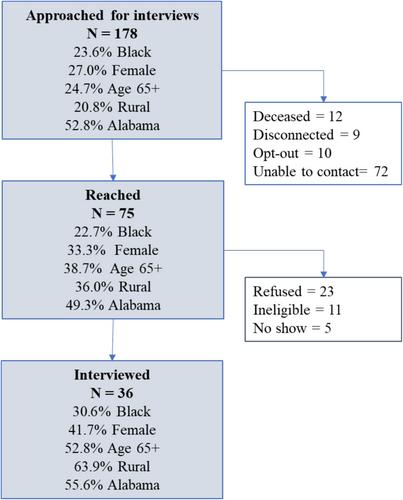Providers' and Survivors' Perspectives on Affordability Challenges for Gastrointestinal Cancer Treatment in Two Low Socioeconomic Status States of the Southern United States
Abstract
Introduction
Affordability is an access to care domain contributing to disparities in gastrointestinal (GI) cancer outcomes and care, including surgical care. Affordability challenges for GI cancer care in socioeconomically disadvantaged and diverse states of the southern United States are unknown: this paper addresses this knowledge gap.
Methods
We conducted semi-structured interviews with 32 providers (13 surgeons and 19 other) and 36 survivors (53% colorectal, 19% pancreatic, and 28% esophageal cancer) in Alabama and Mississippi. Questions were about barriers and facilitators to surgical care along five domains, including affordability, that is, the relationship between health care costs, patients' income, health insurance coverage, and the resulting ability to afford care. Verbatim transcripts were analyzed using thematic and content analysis.
Results
Themes were about: (1) affordability-related underlying context, that is, (i) patients' limited means and competing basic needs priorities, (ii) scarcity of quality medical services, and (iii) rural hospitals' limited means; (2) barriers to medical decision-making, that is, (i) guideline-concordant care unfeasible due to poverty and (ii) insurance authorizations and coverage delaying and making care costlier; (3) economic burdens from (i) many types of needed expenses and (ii) billing; and (4) strategies to improve affordability, that is, (i) care adjustments to reduce patients' costs, (ii) community organizations' support, and (iii) burdensome access to resources.
Conclusions
Underlying poverty, scarce quality medical services, and restrictive insurance provisions significantly impact medical decision-making, access to quality and prompt care, and economic and administrative burdens. Future research should quantify the extent of these challenges and identify programs and policies to address them.


 求助内容:
求助内容: 应助结果提醒方式:
应助结果提醒方式:


